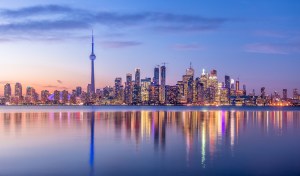Toronto in Canada has been deemed the bubbliest city in the world thanks to strong population growth, low mortgage rates and an abundance of investors.
It’s no wonder then that the Canadian government is banning overseas investors from buying property in Toronto for two years from January 2023.

Another Canadian city to appear on the index is Vancouver, which is ranked the sixth most overvalued city.
The data comes from the UBS Global Real Estate Bubble Index, which reckons London is the 16th bubbliest city out of the 25 analysed.
The index reads: “Real house price levels in Vancouver and Toronto have more than tripled in the last 25 years. An urban housing shortage amid strong population growth and falling mortgage rates are typically seen as the two main culprits of the long-term property bonanza in both Canadian cities. High investment demand has also added significantly to the price increases. The index has been flashing warning signals in the last couple of years.
“The most recent housing frenzy that began in 2019 as mortgage rates fell has continued into 2021. Property price growth in Vancouver and Toronto accelerated to its highest rate in five years, with house prices now respectively 14% and 17% higher than a year ago. Up-sizing during the pandemic on the back of strong income growth has done its part in pushing up demand.
“Households have also been leveraging up at the fastest pace since before the financial crisis. And although the rental market is running hot with rents climbing by more than double their five-year average rates, they could not keep up with the pace in the owner-occupied market. Bubble risk for both Canadian cities is again highly elevated. “
The index added that a price correction is due in the Canadian cities, when higher mortgage rates start to bite – similar to the situation we’ve seen in England.
 On London, UBS said: “The risk of a real estate bubble in London has slightly decreased compared to a year ago, but still leaves the housing market in overvalued territory.
On London, UBS said: “The risk of a real estate bubble in London has slightly decreased compared to a year ago, but still leaves the housing market in overvalued territory.
“Looking forward, abolishing the interest rate criteria for mortgage affordability should lead to a modest increase in borrowing, which could boost both demand and prices.
“However, several storm clouds cap the potential for high future price growth. Mortgage rates have tripled from their lows in mid 2021, increasing the cost of owning property. The ending of the stamp duty holiday will likely reduce housing demand as well.
“And while the weak British pound makes properties in the city look attractive to foreign buyers, they will keep in mind that currency depreciation has eradicated a big portion of capital gains in the past.”
Other cities deemed a ‘bubble risk’, in this order, are: Frankfurt, Germany; Zurich, Switzerland; Munich, Germany; Hong Kong, China; Amsterdam, The Netherlands; Tel Aviv, Israel; and Tokyo, Japan.
UBS defines a “bubble” as a “substantial and sustained mispricing of an asset, the existence of which cannot be proved unless it bursts”.


